Managerial Escalator: Analyzing Managerial Progression in Two Firms
VerifiedAdded on 2023/04/23
|13
|2786
|171
Report
AI Summary
This report delves into the concept of the managerial escalator, using the framework established by Rees and Potter (2015) to compare the career trajectories of two managers within the same insurance company. The report is divided into two main parts: the first explains the theoretical basis of the managerial escalator, including concepts like the managerial hybrid and remedial strategies. The second part analyzes interviews with a head of sales and a head of internal operations, examining their career growth, challenges faced, and alignment with the managerial escalator principle. The findings reveal that both managers' experiences largely align with the escalator concept, demonstrating progression from specialist roles to managerial positions, supported by training and experience. The report concludes with a discussion of the findings and offers recommendations, highlighting the importance of training, motivation, and team work in managerial success. The methodology and limitations of the research are also addressed. The report aims to provide insights into managerial progression and the applicability of the managerial escalator model.
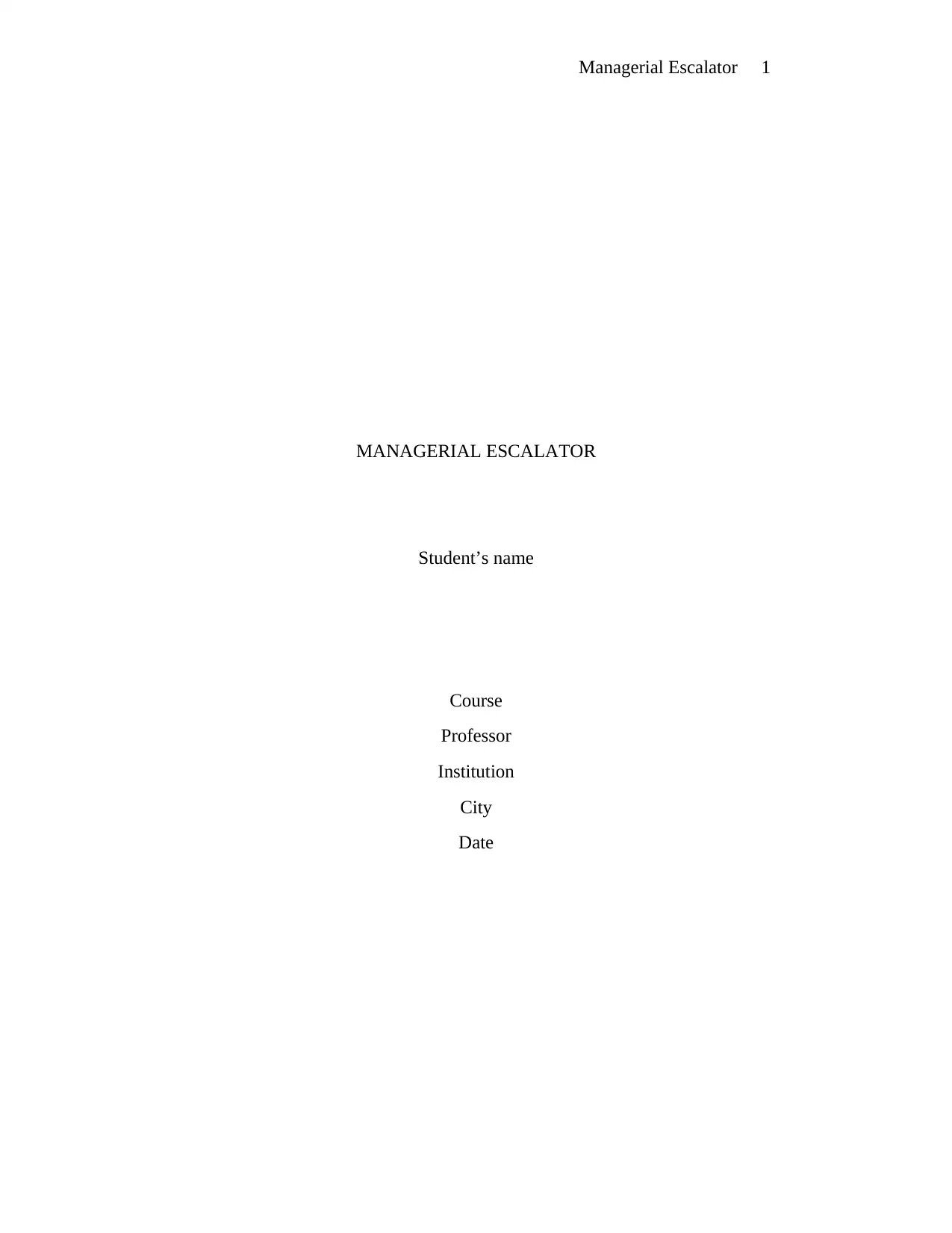
Managerial Escalator 1
MANAGERIAL ESCALATOR
Student’s name
Course
Professor
Institution
City
Date
MANAGERIAL ESCALATOR
Student’s name
Course
Professor
Institution
City
Date
Paraphrase This Document
Need a fresh take? Get an instant paraphrase of this document with our AI Paraphraser
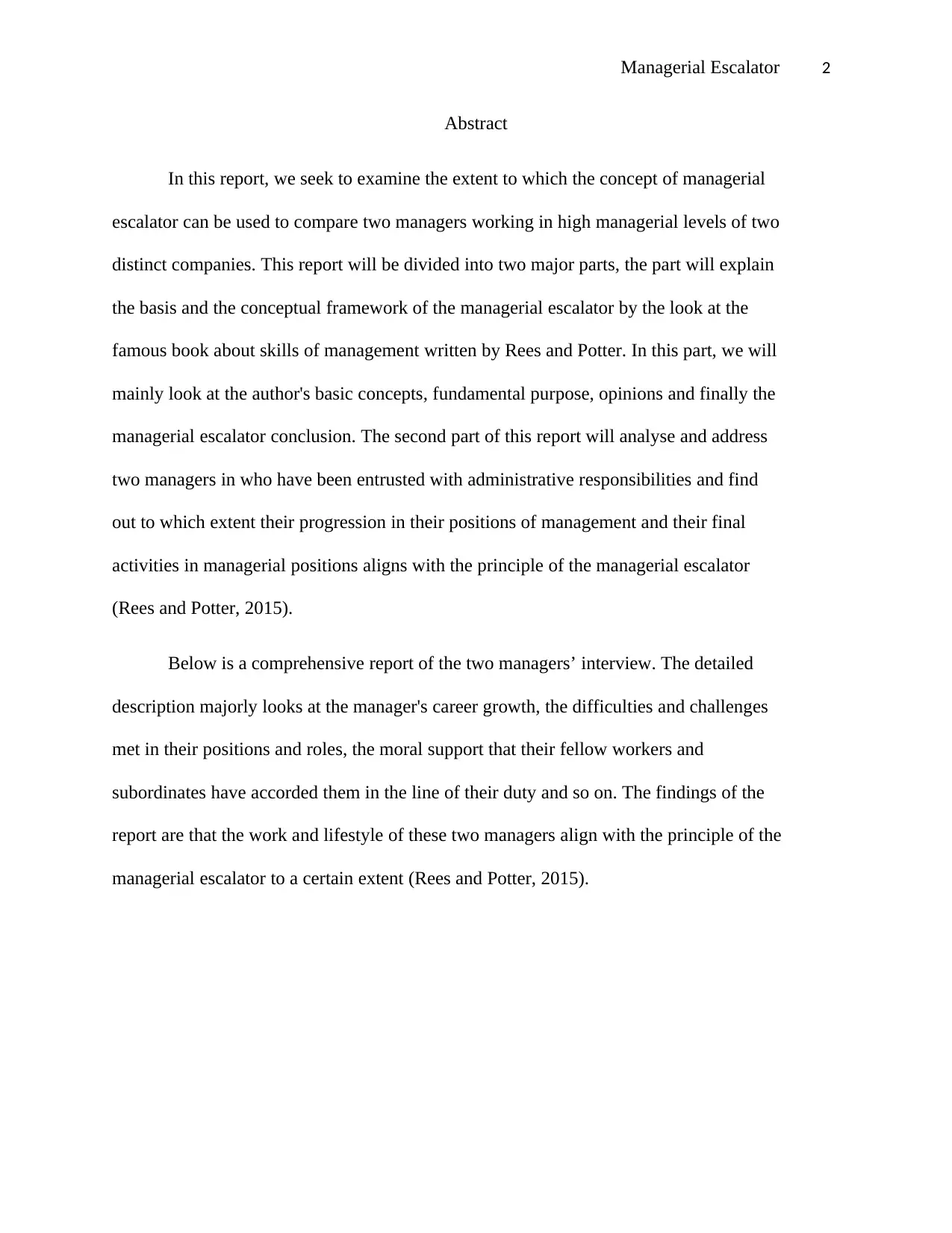
Managerial Escalator 2
Abstract
In this report, we seek to examine the extent to which the concept of managerial
escalator can be used to compare two managers working in high managerial levels of two
distinct companies. This report will be divided into two major parts, the part will explain
the basis and the conceptual framework of the managerial escalator by the look at the
famous book about skills of management written by Rees and Potter. In this part, we will
mainly look at the author's basic concepts, fundamental purpose, opinions and finally the
managerial escalator conclusion. The second part of this report will analyse and address
two managers in who have been entrusted with administrative responsibilities and find
out to which extent their progression in their positions of management and their final
activities in managerial positions aligns with the principle of the managerial escalator
(Rees and Potter, 2015).
Below is a comprehensive report of the two managers’ interview. The detailed
description majorly looks at the manager's career growth, the difficulties and challenges
met in their positions and roles, the moral support that their fellow workers and
subordinates have accorded them in the line of their duty and so on. The findings of the
report are that the work and lifestyle of these two managers align with the principle of the
managerial escalator to a certain extent (Rees and Potter, 2015).
Abstract
In this report, we seek to examine the extent to which the concept of managerial
escalator can be used to compare two managers working in high managerial levels of two
distinct companies. This report will be divided into two major parts, the part will explain
the basis and the conceptual framework of the managerial escalator by the look at the
famous book about skills of management written by Rees and Potter. In this part, we will
mainly look at the author's basic concepts, fundamental purpose, opinions and finally the
managerial escalator conclusion. The second part of this report will analyse and address
two managers in who have been entrusted with administrative responsibilities and find
out to which extent their progression in their positions of management and their final
activities in managerial positions aligns with the principle of the managerial escalator
(Rees and Potter, 2015).
Below is a comprehensive report of the two managers’ interview. The detailed
description majorly looks at the manager's career growth, the difficulties and challenges
met in their positions and roles, the moral support that their fellow workers and
subordinates have accorded them in the line of their duty and so on. The findings of the
report are that the work and lifestyle of these two managers align with the principle of the
managerial escalator to a certain extent (Rees and Potter, 2015).
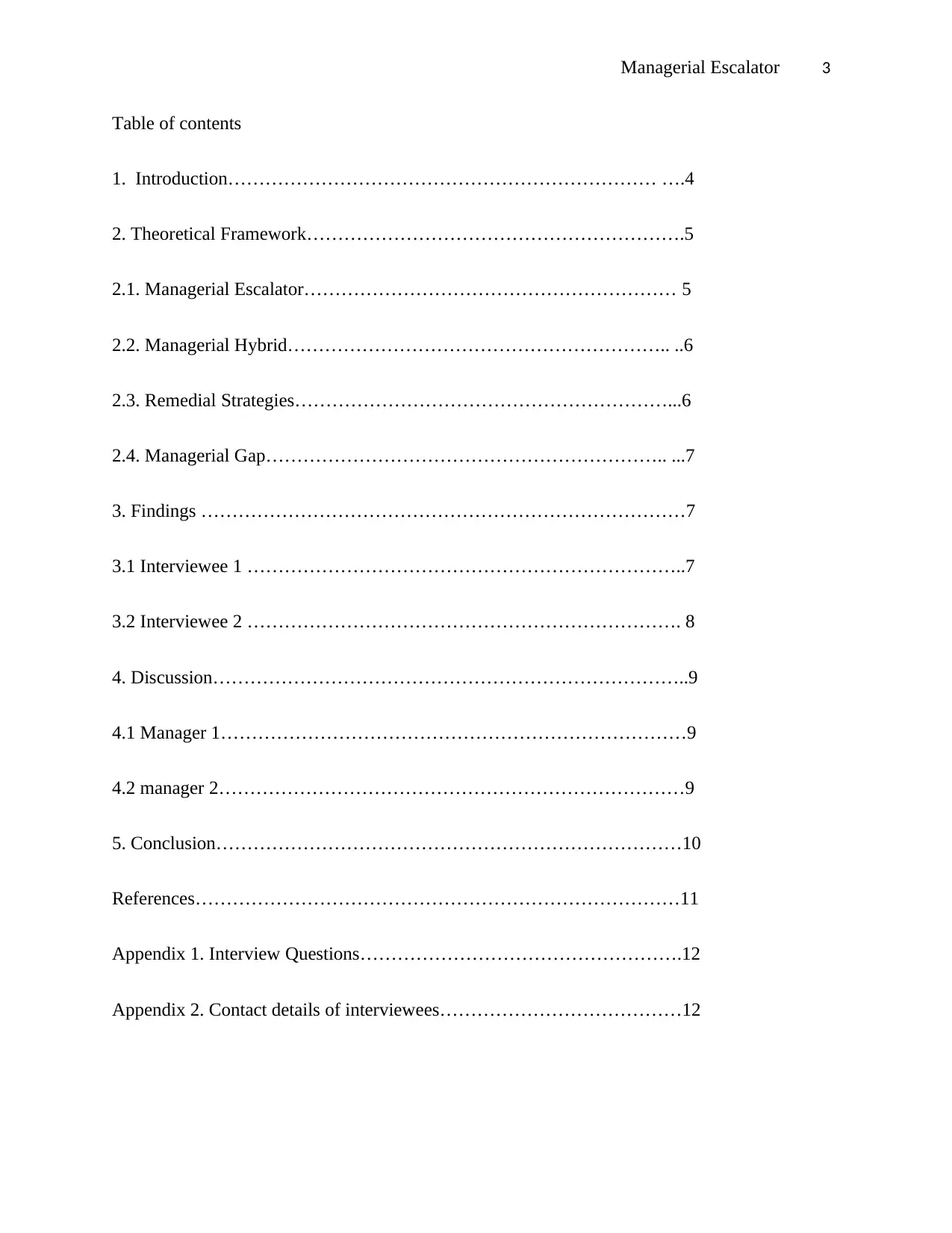
Managerial Escalator 3
Table of contents
1. Introduction…………………………………………………………… ….4
2. Theoretical Framework…………………………………………………….5
2.1. Managerial Escalator…………………………………………………… 5
2.2. Managerial Hybrid…………………………………………………….. ..6
2.3. Remedial Strategies……………………………………………………...6
2.4. Managerial Gap……………………………………………………….. ...7
3. Findings ……………………………………………………………………7
3.1 Interviewee 1 ……………………………………………………………..7
3.2 Interviewee 2 ……………………………………………………………. 8
4. Discussion…………………………………………………………………..9
4.1 Manager 1…………………………………………………………………9
4.2 manager 2…………………………………………………………………9
5. Conclusion…………………………………………………………………10
References……………………………………………………………………11
Appendix 1. Interview Questions…………………………………………….12
Appendix 2. Contact details of interviewees…………………………………12
Table of contents
1. Introduction…………………………………………………………… ….4
2. Theoretical Framework…………………………………………………….5
2.1. Managerial Escalator…………………………………………………… 5
2.2. Managerial Hybrid…………………………………………………….. ..6
2.3. Remedial Strategies……………………………………………………...6
2.4. Managerial Gap……………………………………………………….. ...7
3. Findings ……………………………………………………………………7
3.1 Interviewee 1 ……………………………………………………………..7
3.2 Interviewee 2 ……………………………………………………………. 8
4. Discussion…………………………………………………………………..9
4.1 Manager 1…………………………………………………………………9
4.2 manager 2…………………………………………………………………9
5. Conclusion…………………………………………………………………10
References……………………………………………………………………11
Appendix 1. Interview Questions…………………………………………….12
Appendix 2. Contact details of interviewees…………………………………12
⊘ This is a preview!⊘
Do you want full access?
Subscribe today to unlock all pages.

Trusted by 1+ million students worldwide
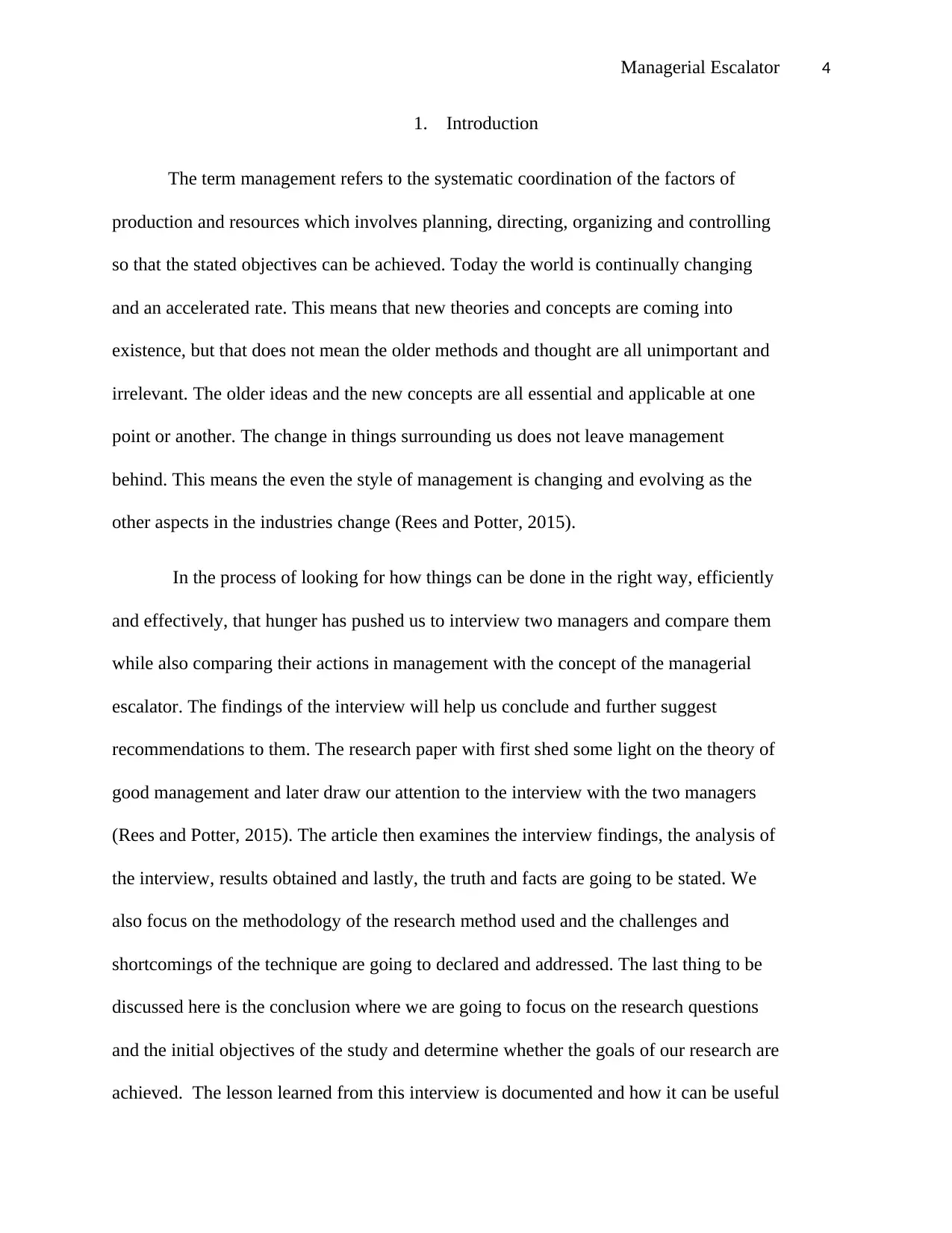
Managerial Escalator 4
1. Introduction
The term management refers to the systematic coordination of the factors of
production and resources which involves planning, directing, organizing and controlling
so that the stated objectives can be achieved. Today the world is continually changing
and an accelerated rate. This means that new theories and concepts are coming into
existence, but that does not mean the older methods and thought are all unimportant and
irrelevant. The older ideas and the new concepts are all essential and applicable at one
point or another. The change in things surrounding us does not leave management
behind. This means the even the style of management is changing and evolving as the
other aspects in the industries change (Rees and Potter, 2015).
In the process of looking for how things can be done in the right way, efficiently
and effectively, that hunger has pushed us to interview two managers and compare them
while also comparing their actions in management with the concept of the managerial
escalator. The findings of the interview will help us conclude and further suggest
recommendations to them. The research paper with first shed some light on the theory of
good management and later draw our attention to the interview with the two managers
(Rees and Potter, 2015). The article then examines the interview findings, the analysis of
the interview, results obtained and lastly, the truth and facts are going to be stated. We
also focus on the methodology of the research method used and the challenges and
shortcomings of the technique are going to declared and addressed. The last thing to be
discussed here is the conclusion where we are going to focus on the research questions
and the initial objectives of the study and determine whether the goals of our research are
achieved. The lesson learned from this interview is documented and how it can be useful
1. Introduction
The term management refers to the systematic coordination of the factors of
production and resources which involves planning, directing, organizing and controlling
so that the stated objectives can be achieved. Today the world is continually changing
and an accelerated rate. This means that new theories and concepts are coming into
existence, but that does not mean the older methods and thought are all unimportant and
irrelevant. The older ideas and the new concepts are all essential and applicable at one
point or another. The change in things surrounding us does not leave management
behind. This means the even the style of management is changing and evolving as the
other aspects in the industries change (Rees and Potter, 2015).
In the process of looking for how things can be done in the right way, efficiently
and effectively, that hunger has pushed us to interview two managers and compare them
while also comparing their actions in management with the concept of the managerial
escalator. The findings of the interview will help us conclude and further suggest
recommendations to them. The research paper with first shed some light on the theory of
good management and later draw our attention to the interview with the two managers
(Rees and Potter, 2015). The article then examines the interview findings, the analysis of
the interview, results obtained and lastly, the truth and facts are going to be stated. We
also focus on the methodology of the research method used and the challenges and
shortcomings of the technique are going to declared and addressed. The last thing to be
discussed here is the conclusion where we are going to focus on the research questions
and the initial objectives of the study and determine whether the goals of our research are
achieved. The lesson learned from this interview is documented and how it can be useful
Paraphrase This Document
Need a fresh take? Get an instant paraphrase of this document with our AI Paraphraser
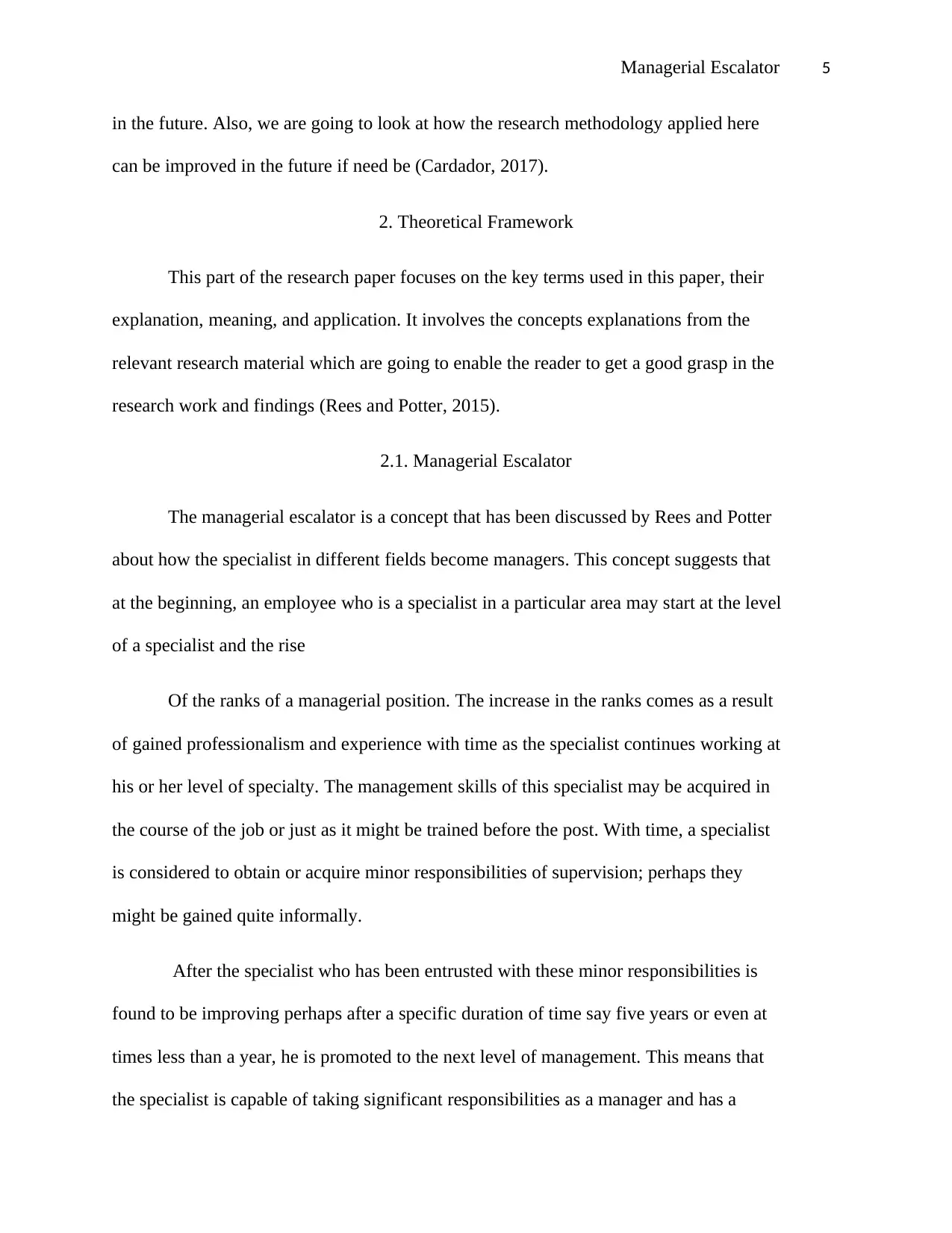
Managerial Escalator 5
in the future. Also, we are going to look at how the research methodology applied here
can be improved in the future if need be (Cardador, 2017).
2. Theoretical Framework
This part of the research paper focuses on the key terms used in this paper, their
explanation, meaning, and application. It involves the concepts explanations from the
relevant research material which are going to enable the reader to get a good grasp in the
research work and findings (Rees and Potter, 2015).
2.1. Managerial Escalator
The managerial escalator is a concept that has been discussed by Rees and Potter
about how the specialist in different fields become managers. This concept suggests that
at the beginning, an employee who is a specialist in a particular area may start at the level
of a specialist and the rise
Of the ranks of a managerial position. The increase in the ranks comes as a result
of gained professionalism and experience with time as the specialist continues working at
his or her level of specialty. The management skills of this specialist may be acquired in
the course of the job or just as it might be trained before the post. With time, a specialist
is considered to obtain or acquire minor responsibilities of supervision; perhaps they
might be gained quite informally.
After the specialist who has been entrusted with these minor responsibilities is
found to be improving perhaps after a specific duration of time say five years or even at
times less than a year, he is promoted to the next level of management. This means that
the specialist is capable of taking significant responsibilities as a manager and has a
in the future. Also, we are going to look at how the research methodology applied here
can be improved in the future if need be (Cardador, 2017).
2. Theoretical Framework
This part of the research paper focuses on the key terms used in this paper, their
explanation, meaning, and application. It involves the concepts explanations from the
relevant research material which are going to enable the reader to get a good grasp in the
research work and findings (Rees and Potter, 2015).
2.1. Managerial Escalator
The managerial escalator is a concept that has been discussed by Rees and Potter
about how the specialist in different fields become managers. This concept suggests that
at the beginning, an employee who is a specialist in a particular area may start at the level
of a specialist and the rise
Of the ranks of a managerial position. The increase in the ranks comes as a result
of gained professionalism and experience with time as the specialist continues working at
his or her level of specialty. The management skills of this specialist may be acquired in
the course of the job or just as it might be trained before the post. With time, a specialist
is considered to obtain or acquire minor responsibilities of supervision; perhaps they
might be gained quite informally.
After the specialist who has been entrusted with these minor responsibilities is
found to be improving perhaps after a specific duration of time say five years or even at
times less than a year, he is promoted to the next level of management. This means that
the specialist is capable of taking significant responsibilities as a manager and has a
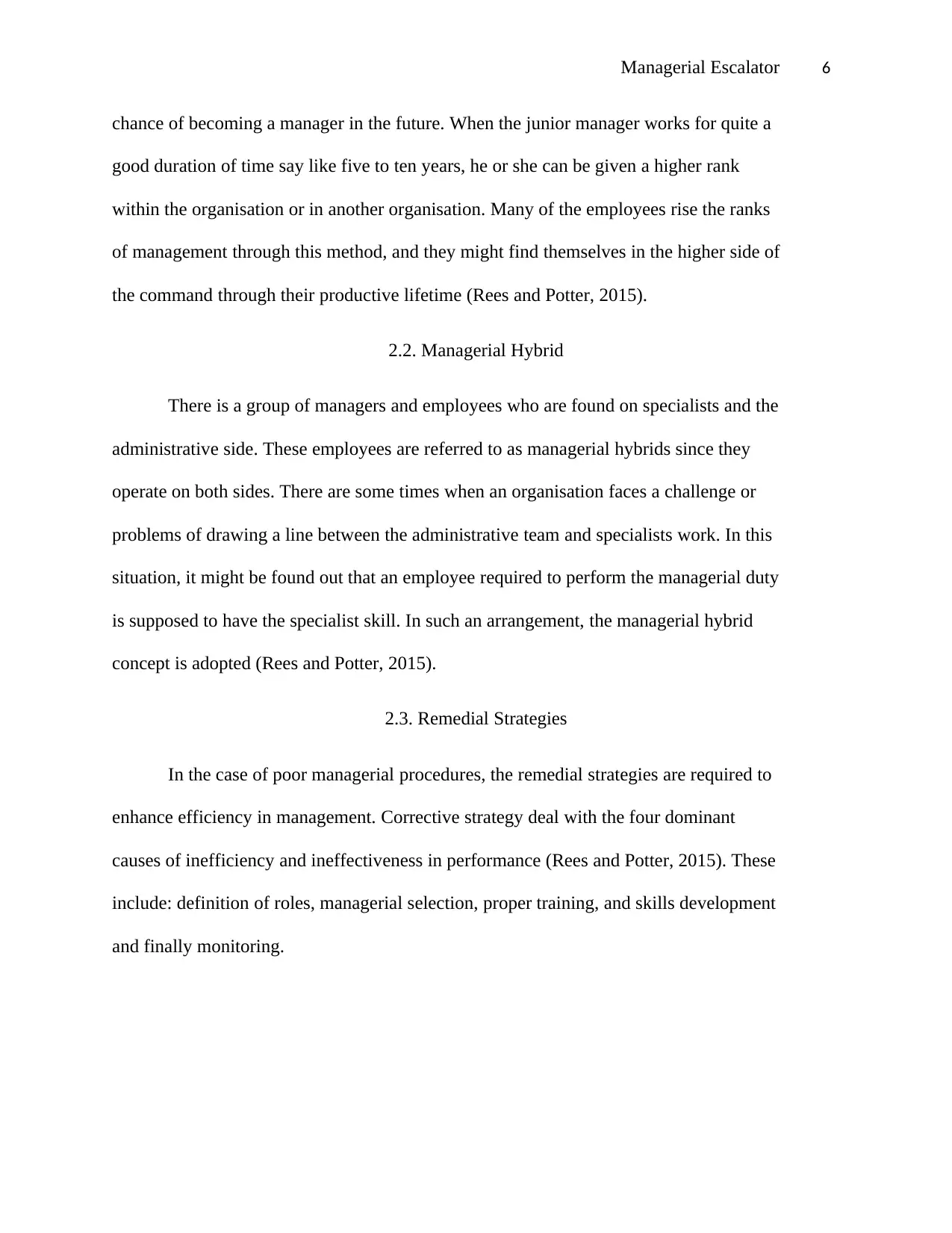
Managerial Escalator 6
chance of becoming a manager in the future. When the junior manager works for quite a
good duration of time say like five to ten years, he or she can be given a higher rank
within the organisation or in another organisation. Many of the employees rise the ranks
of management through this method, and they might find themselves in the higher side of
the command through their productive lifetime (Rees and Potter, 2015).
2.2. Managerial Hybrid
There is a group of managers and employees who are found on specialists and the
administrative side. These employees are referred to as managerial hybrids since they
operate on both sides. There are some times when an organisation faces a challenge or
problems of drawing a line between the administrative team and specialists work. In this
situation, it might be found out that an employee required to perform the managerial duty
is supposed to have the specialist skill. In such an arrangement, the managerial hybrid
concept is adopted (Rees and Potter, 2015).
2.3. Remedial Strategies
In the case of poor managerial procedures, the remedial strategies are required to
enhance efficiency in management. Corrective strategy deal with the four dominant
causes of inefficiency and ineffectiveness in performance (Rees and Potter, 2015). These
include: definition of roles, managerial selection, proper training, and skills development
and finally monitoring.
chance of becoming a manager in the future. When the junior manager works for quite a
good duration of time say like five to ten years, he or she can be given a higher rank
within the organisation or in another organisation. Many of the employees rise the ranks
of management through this method, and they might find themselves in the higher side of
the command through their productive lifetime (Rees and Potter, 2015).
2.2. Managerial Hybrid
There is a group of managers and employees who are found on specialists and the
administrative side. These employees are referred to as managerial hybrids since they
operate on both sides. There are some times when an organisation faces a challenge or
problems of drawing a line between the administrative team and specialists work. In this
situation, it might be found out that an employee required to perform the managerial duty
is supposed to have the specialist skill. In such an arrangement, the managerial hybrid
concept is adopted (Rees and Potter, 2015).
2.3. Remedial Strategies
In the case of poor managerial procedures, the remedial strategies are required to
enhance efficiency in management. Corrective strategy deal with the four dominant
causes of inefficiency and ineffectiveness in performance (Rees and Potter, 2015). These
include: definition of roles, managerial selection, proper training, and skills development
and finally monitoring.
⊘ This is a preview!⊘
Do you want full access?
Subscribe today to unlock all pages.

Trusted by 1+ million students worldwide
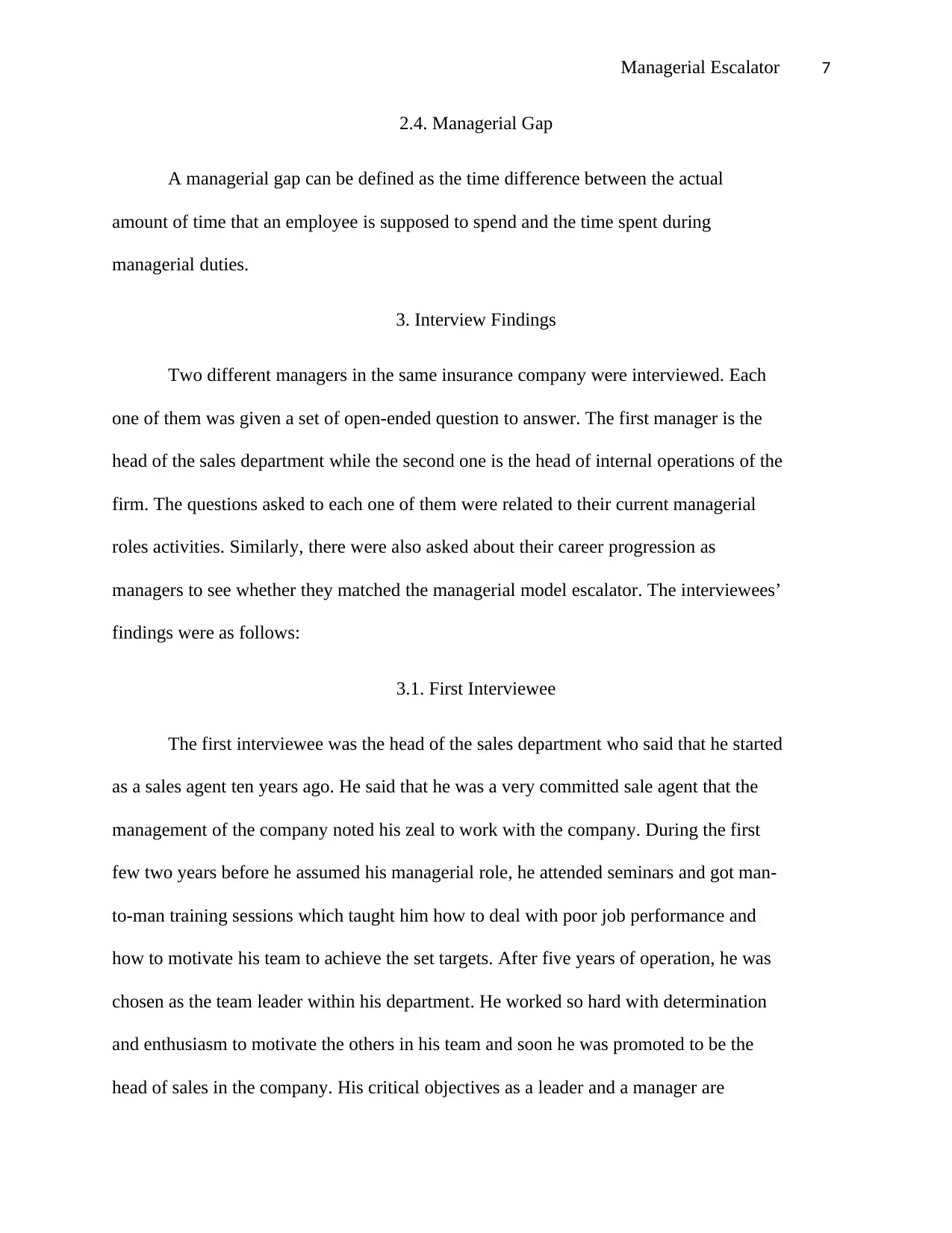
Managerial Escalator 7
2.4. Managerial Gap
A managerial gap can be defined as the time difference between the actual
amount of time that an employee is supposed to spend and the time spent during
managerial duties.
3. Interview Findings
Two different managers in the same insurance company were interviewed. Each
one of them was given a set of open-ended question to answer. The first manager is the
head of the sales department while the second one is the head of internal operations of the
firm. The questions asked to each one of them were related to their current managerial
roles activities. Similarly, there were also asked about their career progression as
managers to see whether they matched the managerial model escalator. The interviewees’
findings were as follows:
3.1. First Interviewee
The first interviewee was the head of the sales department who said that he started
as a sales agent ten years ago. He said that he was a very committed sale agent that the
management of the company noted his zeal to work with the company. During the first
few two years before he assumed his managerial role, he attended seminars and got man-
to-man training sessions which taught him how to deal with poor job performance and
how to motivate his team to achieve the set targets. After five years of operation, he was
chosen as the team leader within his department. He worked so hard with determination
and enthusiasm to motivate the others in his team and soon he was promoted to be the
head of sales in the company. His critical objectives as a leader and a manager are
2.4. Managerial Gap
A managerial gap can be defined as the time difference between the actual
amount of time that an employee is supposed to spend and the time spent during
managerial duties.
3. Interview Findings
Two different managers in the same insurance company were interviewed. Each
one of them was given a set of open-ended question to answer. The first manager is the
head of the sales department while the second one is the head of internal operations of the
firm. The questions asked to each one of them were related to their current managerial
roles activities. Similarly, there were also asked about their career progression as
managers to see whether they matched the managerial model escalator. The interviewees’
findings were as follows:
3.1. First Interviewee
The first interviewee was the head of the sales department who said that he started
as a sales agent ten years ago. He said that he was a very committed sale agent that the
management of the company noted his zeal to work with the company. During the first
few two years before he assumed his managerial role, he attended seminars and got man-
to-man training sessions which taught him how to deal with poor job performance and
how to motivate his team to achieve the set targets. After five years of operation, he was
chosen as the team leader within his department. He worked so hard with determination
and enthusiasm to motivate the others in his team and soon he was promoted to be the
head of sales in the company. His critical objectives as a leader and a manager are
Paraphrase This Document
Need a fresh take? Get an instant paraphrase of this document with our AI Paraphraser
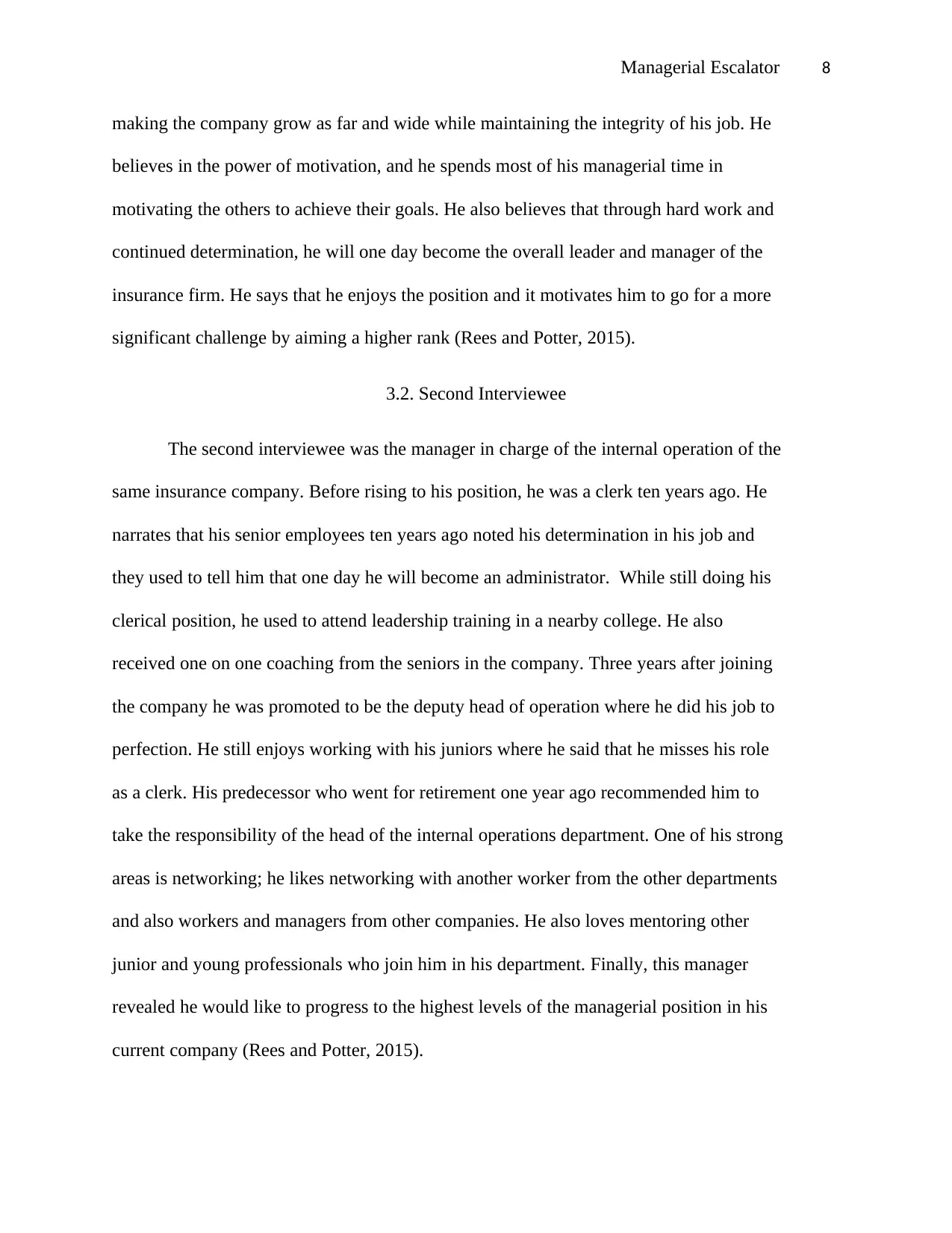
Managerial Escalator 8
making the company grow as far and wide while maintaining the integrity of his job. He
believes in the power of motivation, and he spends most of his managerial time in
motivating the others to achieve their goals. He also believes that through hard work and
continued determination, he will one day become the overall leader and manager of the
insurance firm. He says that he enjoys the position and it motivates him to go for a more
significant challenge by aiming a higher rank (Rees and Potter, 2015).
3.2. Second Interviewee
The second interviewee was the manager in charge of the internal operation of the
same insurance company. Before rising to his position, he was a clerk ten years ago. He
narrates that his senior employees ten years ago noted his determination in his job and
they used to tell him that one day he will become an administrator. While still doing his
clerical position, he used to attend leadership training in a nearby college. He also
received one on one coaching from the seniors in the company. Three years after joining
the company he was promoted to be the deputy head of operation where he did his job to
perfection. He still enjoys working with his juniors where he said that he misses his role
as a clerk. His predecessor who went for retirement one year ago recommended him to
take the responsibility of the head of the internal operations department. One of his strong
areas is networking; he likes networking with another worker from the other departments
and also workers and managers from other companies. He also loves mentoring other
junior and young professionals who join him in his department. Finally, this manager
revealed he would like to progress to the highest levels of the managerial position in his
current company (Rees and Potter, 2015).
making the company grow as far and wide while maintaining the integrity of his job. He
believes in the power of motivation, and he spends most of his managerial time in
motivating the others to achieve their goals. He also believes that through hard work and
continued determination, he will one day become the overall leader and manager of the
insurance firm. He says that he enjoys the position and it motivates him to go for a more
significant challenge by aiming a higher rank (Rees and Potter, 2015).
3.2. Second Interviewee
The second interviewee was the manager in charge of the internal operation of the
same insurance company. Before rising to his position, he was a clerk ten years ago. He
narrates that his senior employees ten years ago noted his determination in his job and
they used to tell him that one day he will become an administrator. While still doing his
clerical position, he used to attend leadership training in a nearby college. He also
received one on one coaching from the seniors in the company. Three years after joining
the company he was promoted to be the deputy head of operation where he did his job to
perfection. He still enjoys working with his juniors where he said that he misses his role
as a clerk. His predecessor who went for retirement one year ago recommended him to
take the responsibility of the head of the internal operations department. One of his strong
areas is networking; he likes networking with another worker from the other departments
and also workers and managers from other companies. He also loves mentoring other
junior and young professionals who join him in his department. Finally, this manager
revealed he would like to progress to the highest levels of the managerial position in his
current company (Rees and Potter, 2015).
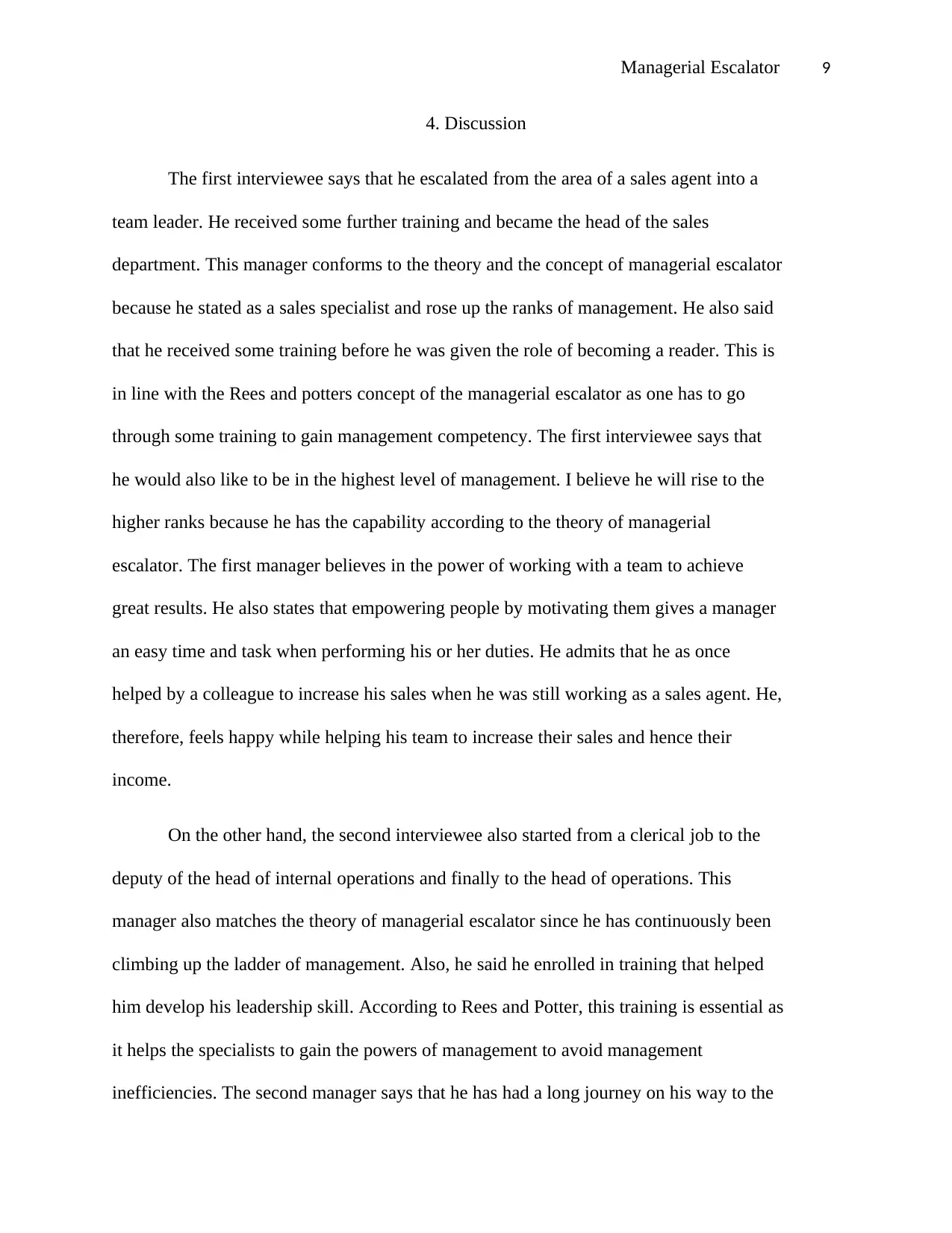
Managerial Escalator 9
4. Discussion
The first interviewee says that he escalated from the area of a sales agent into a
team leader. He received some further training and became the head of the sales
department. This manager conforms to the theory and the concept of managerial escalator
because he stated as a sales specialist and rose up the ranks of management. He also said
that he received some training before he was given the role of becoming a reader. This is
in line with the Rees and potters concept of the managerial escalator as one has to go
through some training to gain management competency. The first interviewee says that
he would also like to be in the highest level of management. I believe he will rise to the
higher ranks because he has the capability according to the theory of managerial
escalator. The first manager believes in the power of working with a team to achieve
great results. He also states that empowering people by motivating them gives a manager
an easy time and task when performing his or her duties. He admits that he as once
helped by a colleague to increase his sales when he was still working as a sales agent. He,
therefore, feels happy while helping his team to increase their sales and hence their
income.
On the other hand, the second interviewee also started from a clerical job to the
deputy of the head of internal operations and finally to the head of operations. This
manager also matches the theory of managerial escalator since he has continuously been
climbing up the ladder of management. Also, he said he enrolled in training that helped
him develop his leadership skill. According to Rees and Potter, this training is essential as
it helps the specialists to gain the powers of management to avoid management
inefficiencies. The second manager says that he has had a long journey on his way to the
4. Discussion
The first interviewee says that he escalated from the area of a sales agent into a
team leader. He received some further training and became the head of the sales
department. This manager conforms to the theory and the concept of managerial escalator
because he stated as a sales specialist and rose up the ranks of management. He also said
that he received some training before he was given the role of becoming a reader. This is
in line with the Rees and potters concept of the managerial escalator as one has to go
through some training to gain management competency. The first interviewee says that
he would also like to be in the highest level of management. I believe he will rise to the
higher ranks because he has the capability according to the theory of managerial
escalator. The first manager believes in the power of working with a team to achieve
great results. He also states that empowering people by motivating them gives a manager
an easy time and task when performing his or her duties. He admits that he as once
helped by a colleague to increase his sales when he was still working as a sales agent. He,
therefore, feels happy while helping his team to increase their sales and hence their
income.
On the other hand, the second interviewee also started from a clerical job to the
deputy of the head of internal operations and finally to the head of operations. This
manager also matches the theory of managerial escalator since he has continuously been
climbing up the ladder of management. Also, he said he enrolled in training that helped
him develop his leadership skill. According to Rees and Potter, this training is essential as
it helps the specialists to gain the powers of management to avoid management
inefficiencies. The second manager says that he has had a long journey on his way to the
⊘ This is a preview!⊘
Do you want full access?
Subscribe today to unlock all pages.

Trusted by 1+ million students worldwide
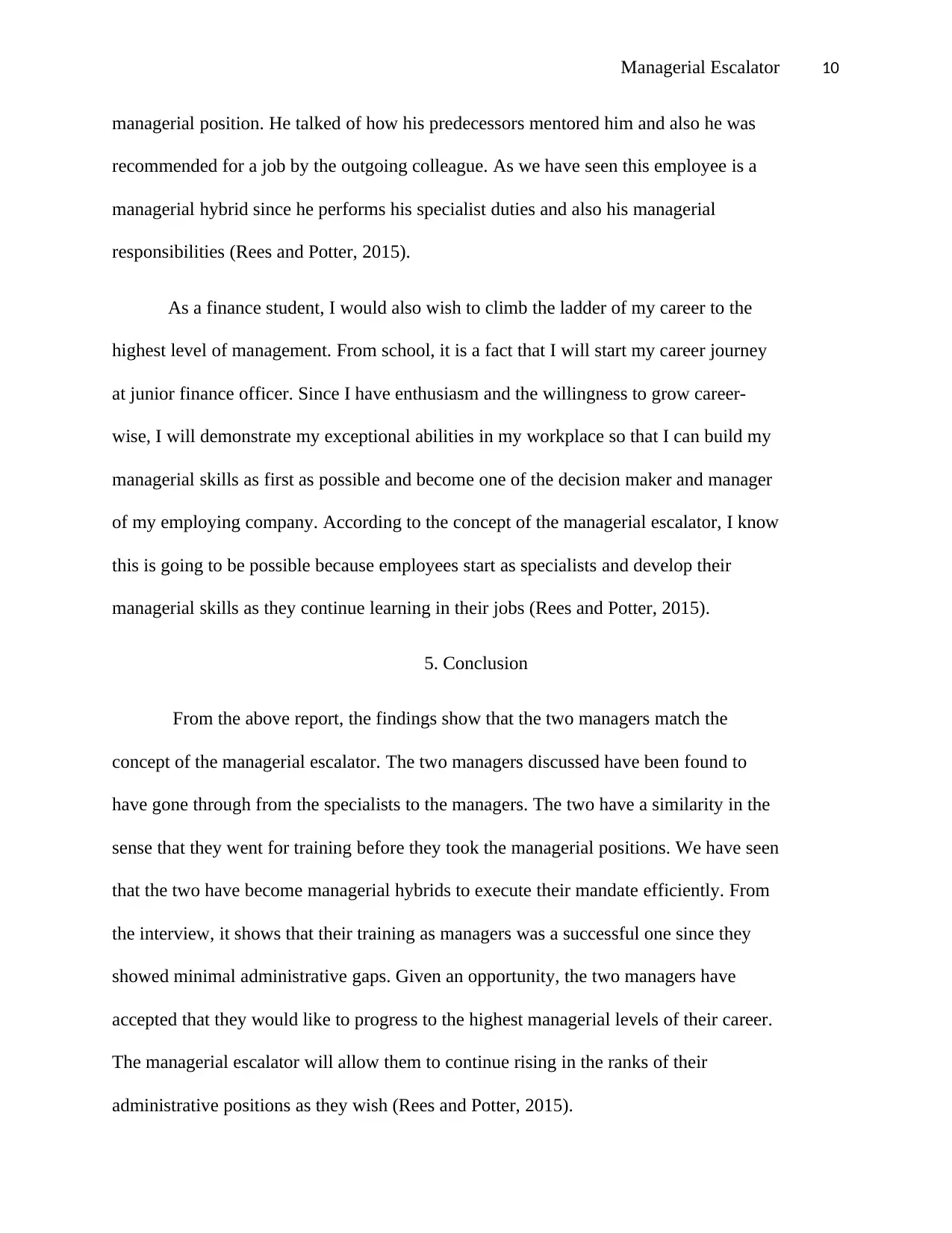
Managerial Escalator 10
managerial position. He talked of how his predecessors mentored him and also he was
recommended for a job by the outgoing colleague. As we have seen this employee is a
managerial hybrid since he performs his specialist duties and also his managerial
responsibilities (Rees and Potter, 2015).
As a finance student, I would also wish to climb the ladder of my career to the
highest level of management. From school, it is a fact that I will start my career journey
at junior finance officer. Since I have enthusiasm and the willingness to grow career-
wise, I will demonstrate my exceptional abilities in my workplace so that I can build my
managerial skills as first as possible and become one of the decision maker and manager
of my employing company. According to the concept of the managerial escalator, I know
this is going to be possible because employees start as specialists and develop their
managerial skills as they continue learning in their jobs (Rees and Potter, 2015).
5. Conclusion
From the above report, the findings show that the two managers match the
concept of the managerial escalator. The two managers discussed have been found to
have gone through from the specialists to the managers. The two have a similarity in the
sense that they went for training before they took the managerial positions. We have seen
that the two have become managerial hybrids to execute their mandate efficiently. From
the interview, it shows that their training as managers was a successful one since they
showed minimal administrative gaps. Given an opportunity, the two managers have
accepted that they would like to progress to the highest managerial levels of their career.
The managerial escalator will allow them to continue rising in the ranks of their
administrative positions as they wish (Rees and Potter, 2015).
managerial position. He talked of how his predecessors mentored him and also he was
recommended for a job by the outgoing colleague. As we have seen this employee is a
managerial hybrid since he performs his specialist duties and also his managerial
responsibilities (Rees and Potter, 2015).
As a finance student, I would also wish to climb the ladder of my career to the
highest level of management. From school, it is a fact that I will start my career journey
at junior finance officer. Since I have enthusiasm and the willingness to grow career-
wise, I will demonstrate my exceptional abilities in my workplace so that I can build my
managerial skills as first as possible and become one of the decision maker and manager
of my employing company. According to the concept of the managerial escalator, I know
this is going to be possible because employees start as specialists and develop their
managerial skills as they continue learning in their jobs (Rees and Potter, 2015).
5. Conclusion
From the above report, the findings show that the two managers match the
concept of the managerial escalator. The two managers discussed have been found to
have gone through from the specialists to the managers. The two have a similarity in the
sense that they went for training before they took the managerial positions. We have seen
that the two have become managerial hybrids to execute their mandate efficiently. From
the interview, it shows that their training as managers was a successful one since they
showed minimal administrative gaps. Given an opportunity, the two managers have
accepted that they would like to progress to the highest managerial levels of their career.
The managerial escalator will allow them to continue rising in the ranks of their
administrative positions as they wish (Rees and Potter, 2015).
Paraphrase This Document
Need a fresh take? Get an instant paraphrase of this document with our AI Paraphraser
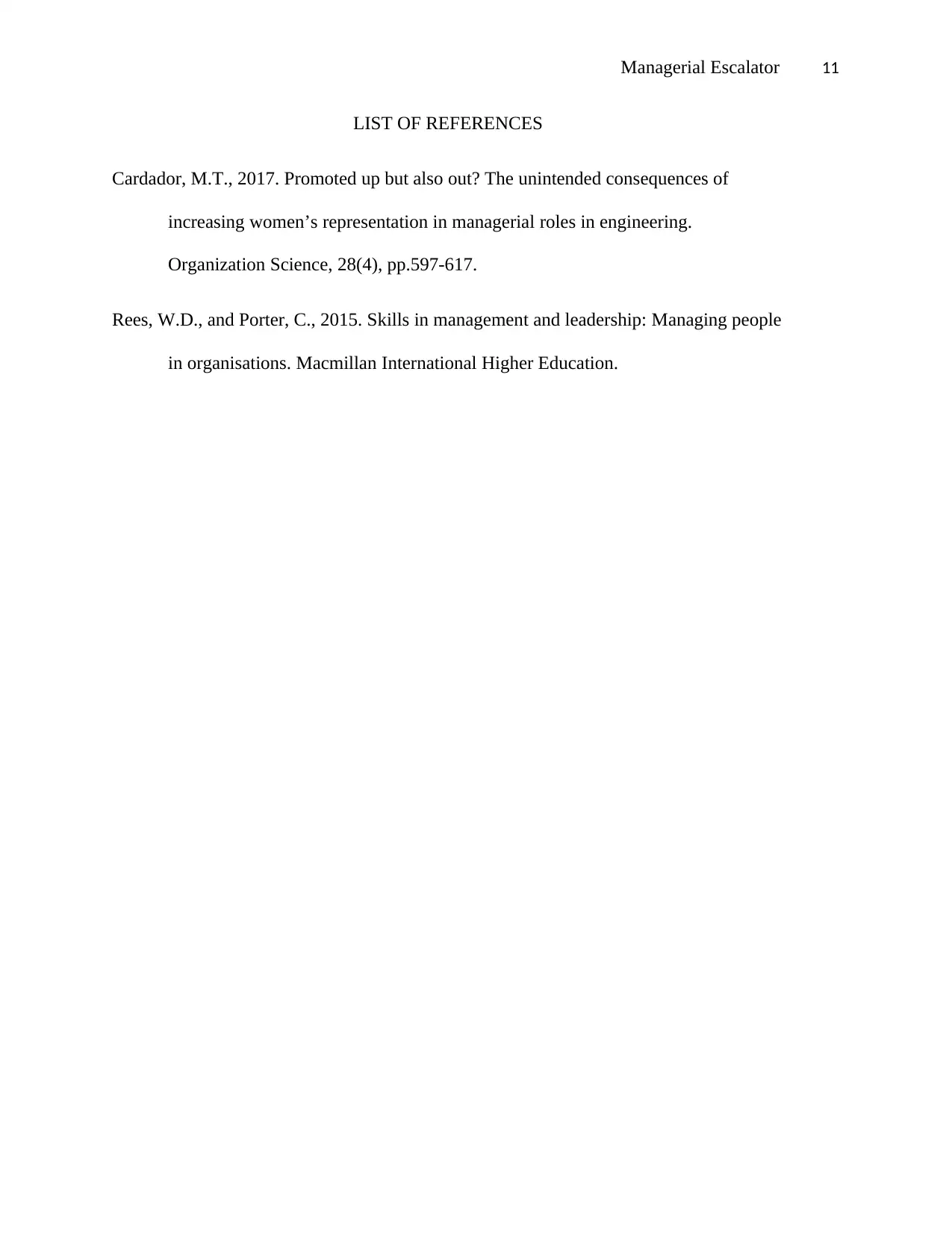
Managerial Escalator 11
LIST OF REFERENCES
Cardador, M.T., 2017. Promoted up but also out? The unintended consequences of
increasing women’s representation in managerial roles in engineering.
Organization Science, 28(4), pp.597-617.
Rees, W.D., and Porter, C., 2015. Skills in management and leadership: Managing people
in organisations. Macmillan International Higher Education.
LIST OF REFERENCES
Cardador, M.T., 2017. Promoted up but also out? The unintended consequences of
increasing women’s representation in managerial roles in engineering.
Organization Science, 28(4), pp.597-617.
Rees, W.D., and Porter, C., 2015. Skills in management and leadership: Managing people
in organisations. Macmillan International Higher Education.
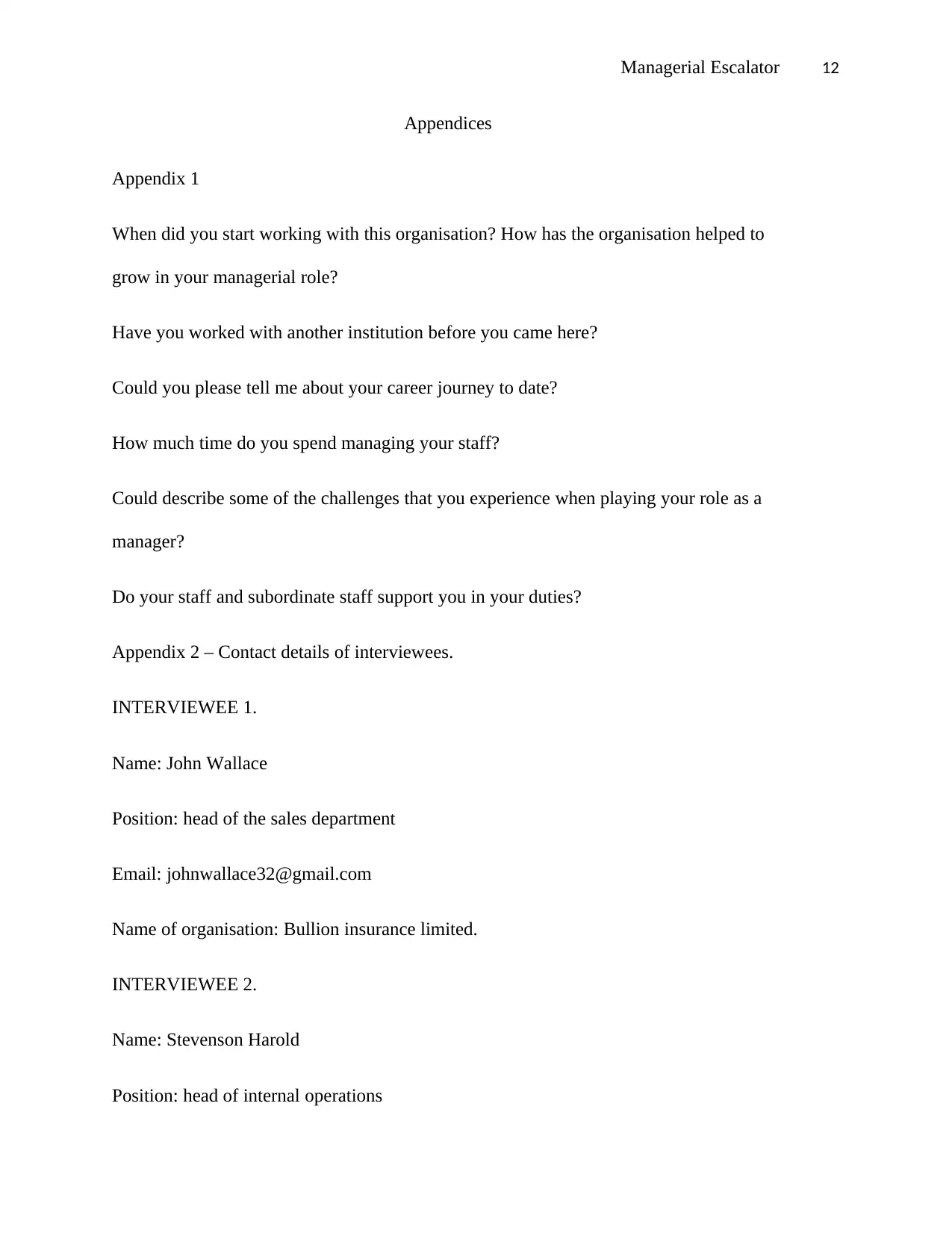
Managerial Escalator 12
Appendices
Appendix 1
When did you start working with this organisation? How has the organisation helped to
grow in your managerial role?
Have you worked with another institution before you came here?
Could you please tell me about your career journey to date?
How much time do you spend managing your staff?
Could describe some of the challenges that you experience when playing your role as a
manager?
Do your staff and subordinate staff support you in your duties?
Appendix 2 – Contact details of interviewees.
INTERVIEWEE 1.
Name: John Wallace
Position: head of the sales department
Email: johnwallace32@gmail.com
Name of organisation: Bullion insurance limited.
INTERVIEWEE 2.
Name: Stevenson Harold
Position: head of internal operations
Appendices
Appendix 1
When did you start working with this organisation? How has the organisation helped to
grow in your managerial role?
Have you worked with another institution before you came here?
Could you please tell me about your career journey to date?
How much time do you spend managing your staff?
Could describe some of the challenges that you experience when playing your role as a
manager?
Do your staff and subordinate staff support you in your duties?
Appendix 2 – Contact details of interviewees.
INTERVIEWEE 1.
Name: John Wallace
Position: head of the sales department
Email: johnwallace32@gmail.com
Name of organisation: Bullion insurance limited.
INTERVIEWEE 2.
Name: Stevenson Harold
Position: head of internal operations
⊘ This is a preview!⊘
Do you want full access?
Subscribe today to unlock all pages.

Trusted by 1+ million students worldwide
1 out of 13
Your All-in-One AI-Powered Toolkit for Academic Success.
+13062052269
info@desklib.com
Available 24*7 on WhatsApp / Email
![[object Object]](/_next/static/media/star-bottom.7253800d.svg)
Unlock your academic potential
Copyright © 2020–2026 A2Z Services. All Rights Reserved. Developed and managed by ZUCOL.


